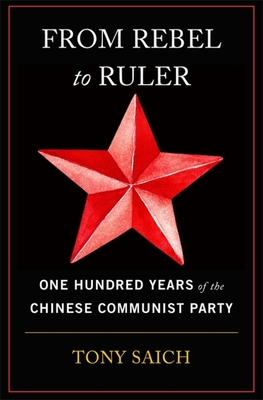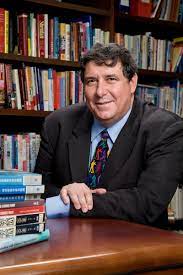

 Belknap Press
Belknap Press
From Rebel to Ruler: One Hundred Years of the Chinese Communist Party


Key Metrics
- Tony Saich
- Belknap Press
- Hardcover
- 9780674988118
- -
- -
- History > Asia - China
- English
 Secure Transaction
Secure TransactionBook Description
On the centennial of the founding of the Chinese Communist Party, the definitive history of how Mao and his successors overcame incredible odds to gain and keep power.
Mao Zedong and the twelve other young men who founded the Chinese Communist Party in 1921 could hardly have imagined that less than thirty years later they would be rulers. On its hundredth anniversary, the party remains in command, leading a nation primed for global dominance.
Tony Saich tells the authoritative, comprehensive story of the Chinese Communist Party--its rise to power against incredible odds, its struggle to consolidate rule and overcome self-inflicted disasters, and its thriving amid other Communist parties' collapse. Saich argues that the brutal Japanese invasion in the 1930s actually helped the party. As the Communists retreated into the countryside, they established themselves as the populist, grassroots alternative to the Nationalists, gaining the support they would need to triumph in the civil war. Once in power, however, the Communists faced the difficult task of learning how to rule. Saich examines the devastating economic consequences of Mao's Great Leap Forward and the political chaos of the Cultural Revolution, as well as the party's rebound under Deng Xiaoping's reforms.
Leninist systems are thought to be rigid, yet the Chinese Communist Party has proved adaptable. From Rebel to Ruler shows that the party owes its endurance to its flexibility. But is it nimble enough to realize Xi Jinping's China Dream? Challenges are multiplying, as the growing middle class makes new demands on the state and the ideological retreat from Communism draws the party further from its revolutionary roots. The legacy of the party may be secure, but its future is anything but guaranteed.
Author Bio
Anthony Saich is the director of the Ash Center for Democratic Governance and Innovation and Daewoo Professor of International Affairs, teaching courses on comparative political institutions, democratic governance, and transitional economies with a focus on China. In his capacity as Ash Center Director, Saich also serves as the director of the Rajawali Foundation Institute for Asia and the faculty chair of the China Programs, the Asia Energy Leaders Program and the Leadership Transformation in Indonesia Program, which provide training programs for national and local Chinese and Indonesian officials.
Saich first visited China as a student in 1976 and continues to visit each year. Currently, he is a guest professor at the School of Public Policy and Management at Tsinghua University, China. He also advises a wide range of government, private, and nonprofit organizations on work in China and elsewhere in Asia.
Saich is a trustee member of he National Committee on US-China Relations (2014-), AMC Entertainment Inc., the chair of the China Medical Board, and International Bridges to Justice. He is also the US Secretary-General of the China United States Strategic Philanthropy. He sits on the executive committees of the John King Fairbank Center for Chinese Studies, Council on Asia Studies, South Asia Initiative and the Asia Center, all at Harvard University. He serves as the Harvard representative of the Kennedy Memorial Trust and previously was the representative for the Ford Foundation’s China Office from 1994 to 1999. Prior to this, he was director of the Sinological Institute at Leiden University in the Netherlands.
His current research focuses on politics and governance in post-Mao China, China’s urbanization and rural-urban inequality in China; and the interplay between state and society in Asia and the respective roles they play in the provision of public goods and services at the local level. His most recent books include Governance and Politics of China (Fourth Edition, 2015); Chinese Village, Global Market (2012); Providing Public Goods in Transitional China (2008); Revolutionary Discourse in Mao’s Republic (with David Apter, 1998); The Rise to Power of the Chinese Communist Party (1996); and China’s Science Policy in the 80s (1989); He has edited books on Political Governance in China, 2015, Philanthropy for Health in China (with Jennifer Ryan and Lincoln Chen, 2014), China's urbanization (with Shahid Yusuf, 2008), HIV/AIDS (with Joan Kaufman and Arthur Kleinman, 2006), and the Reform of China’s Financial Sector ( with Yasheng Huang and Edward Steinfeld., 2005).
He holds a Ph.D. from the Faculty of Letters, University of Leiden, the Netherlands. He received his master’s degree in politics with special reference to China from the School of Oriental and African Studies, London University, and his bachelor’s degree in politics and geography from the University of Newcastle, UK. Away from the office, he enjoys time with his two children, movies, and soccer.
Source: Harvard Kennedy School
Videos
No Videos
Community reviews
Write a ReviewNo Community reviews